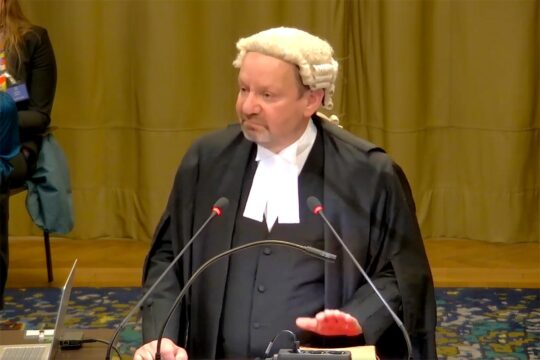Italy and ICTR signed in 2004 an agreement making it possible for the country to receive genocide convicted persons.
The only non-Rwandan indicted by the ICTR, Ruggiu has dual citizenship: Italian and Belgian. Arrested in 1997 in Kenya, he has only 17 months left to complete his prison sentence.
In 1994, Ruggiu was a broadcaster at the Radio Television Libre des Mille Collines (RTLM), which incited the genocide through airwaves.
In addition to Italy, five other countries have already signed an agreement on the enforcement of sentences with the ICTR. They are Mali, Benin, Swaziland, France and Sweden. Rwanda will do so on 4 March, according to the spokesperson of the ICTR, Roland Amoussouga.
The ICTR statute stipulates that "imprisonment shall be served in Rwanda or any of the States which have indicated to the Security Council their willingness to accept convicted persons". Mali has detained, since December 2001, six prisoners, including the former Prime Minister Jean Kambanda.
Three cases were in progress at the tribunal this week. They are Military II, Government II and Butare.
In Military II, which involves four officers, it is the former chief of staff of the Rwandan gendarmerie, General Augustin Ndindiliyimana, who is presenting his defence case. The protected witness "CBP-72" stated that the Rwandan gendarmes did not get along with the Interahamwe militiamen, main armed faction of the 1994 genocide. "It was well known, the gendarmes did not get along with the Interahamwe, they were not on the same wavelength", stated the witness, himself a former gendarme.
General Augustin Ndindiliyimana and his co-defendants are prosecuted for genocide, crimes against humanity and war crimes. They have pleaded not guilty.
The prosecutor alleges that the gendarmes, soldiers and militiamen worked, hand in hand, in the planning of the 1994 genocide, which resulted, according to the UN, in 800 000 deaths, primarily ethnic Tutsis.
The witness disputed the allegations, affirming, by way of example that gendarmes had pushed back in April 1994 an attack launched by the Interahamwe on Tutsis who had sought refuge in the buildings of the Saint-Andrew College in Kigali. "They (Interahamwe) occupied the places where the gendarmerie was not present", he explained.
The witness added that after the beginning of the genocide, the gendarmerie could no longer carry out arrests of criminals because people were fleeing.
The Interahamwe were also mentioned in the Government II trial, in progress since November 2003.
A defence witness affirmed that the former minister of the Civil Service, Prosper Mugiraneza, one of the four defendants, did not have any connection with these militiamen. The protected witness, " LWZ", explained that she was a member of the Interahamwe, youth wing of the former governing party, before they were joined by killers the day after 6 April 1994. "We sang praises for our party, we danced", stated the witness.
"During the war, things were very serious. I do not know if Mugiraneza had an unspecified authority. He could not control the Interahamwe... only if he was ready to die ", said the witness.
The third trial of the week, that of the Butare , a region in southern Rwanda, the judges continued to hear testimony from defence witnesses of the fifth of the six defendants, the former mayor of Ngoma, Joseph
Kanyabashi.
AT/PB/MM/SC
© Hirondelle News Agency



